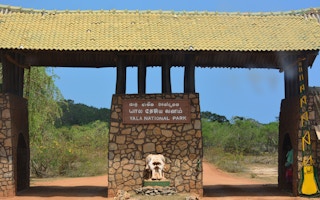Yala National Park, on the southern coastline of Sri Lanka, is one of the nation’s most popular parks, home to dense populations of both Asian elephants and leopards, as well as nearly 100 types of waterbirds and thousands of other species.
The park, one of the oldest on the island, is also now the site of what could become a landmark case in protecting Sri Lanka’s dwindling wildlife habitat. Recently, the Supreme Court ruled in favor of three local environmental groups that had taken on a biofuel company establishing a monoculture plantation in Yala’s buffer zone, imperiling both migrating elephants as well as local farmers and ranchers.
“This is a landmark decision taken in terms of how lands are utilized for development [in Sri Lanka,],” Gayani Hewawasan, an attorney with Environmental Foundation Limited (EFL), told Mongabay.
She added the decision was especially important because it involved scrub forest and traditional shifting agriculture or a mosaic ecosystem that “is usually considered marginal with little conservation protection status legally, yet are viable wildlife habitats [and provide] vital buffers to the declared protected areas.”
Dubbed locally as Amerawewa Forest, the zone is known habitat for Asian elephants.
“Previous studies of radio-collared elephants show that elephants use this area during the dry months,” said Hewawasan. ” Moreover, this area acts as a buffer between [local] settlements and the National Park,” thereby mitigating human-wildlife conflict in the region.
But in 2012, environmental groups were notified that a mysterious company had began clearing vegetation in the region for a biofuel monoculture plantation growing gliricidia (Gliricidia sepium). This tropical tree is traditionally used for a variety of purposes in its native Central America, but only recently has been viewed as a potential woody biofuel. However, outside its natural range, the fast-growing tree can also become a nuisance species.
The company, called United Dendro Energy Pvt Ltd, was eventually linked to Lanka ORIX Leasing Company PLC (LOLC), a financial company, and the Magampura Cattle Owned Farmers Association.
Concerned environmental groups–including EFL, The Wildlife and Nature Protection Society of Sri Lanka (WNPS) and Wilderness and Protection Areas Foundation (WPAF)–took the company to court in late 2012, accusing it of illegally clearing land, building access roads and refusing to get the required permissions.
In August of this year, the Supreme Court finally ruled against the companies and in favor of the environmental watchdogs.
“The company, Dendro United Energy Pvt Ltd, was dissolved and the three parties with interest in the project ceased to pursue this further,” said Hewawasan. The parent company, LOLC, has begun removing the monoculture plantation including all infrastructure.
“No compensation was ordered by court as this was settled in agreement with all relevant authorities,” said Hewawasan.
According to Global Forest Watch, just over 60 percent of Sri Lanka is covered in dense forest. The island country, which is about the size of Florida, lost more than 112,000 hectares – around 3 per cent – of its tree cover between 2001 and 2014.
Sri Lanka is currently home to 2,500 to 4,000 Asian elephants (Elephas maximus), but “the species continues to lose range to development activities throughout the island,” according to the IUCN Red List. Asian elephants have largely been eradicated from Sri Lanka’s wet
zone (the central and southeastern portions of the island) and now largely survive only in the so-called dry zone. The overall population of Asia’s elephants continues a long decline across the continent, largely due to habitat loss and conflict, rather than poaching for tusks like the elephants of Africa although poaching still occurs.
But while the protection Amerawewa Forest is good for the park’s elephants, it’s also good for local herders and farmers, according to Hewawasan. The court’s decision means locals will continue to have access to the area, whereas the monoculture plantations “would have excluded…access.”
In addition, the Amerawewa Forest “serves as a watershed for several small irrigated lakes in the adjacent settlements, which are located in a drought prone area,” said Hewawasan who added, “2014 was a drought year and this climatic zone of Sri Lanka has been identified as one there would be prone to severe droughts in future due to climate change.”
Hewawasan believes the court’s decision will not only protect the buffer zone’s landscape, but also potentially have impacts across Sri Lanka.
“This court ruling will ensure that the Forest Department or other state entity will not be devolving state forest land for any private company for projects outside of the legal procedure,” she said.
This story was published with permission from Mongabay.com.










